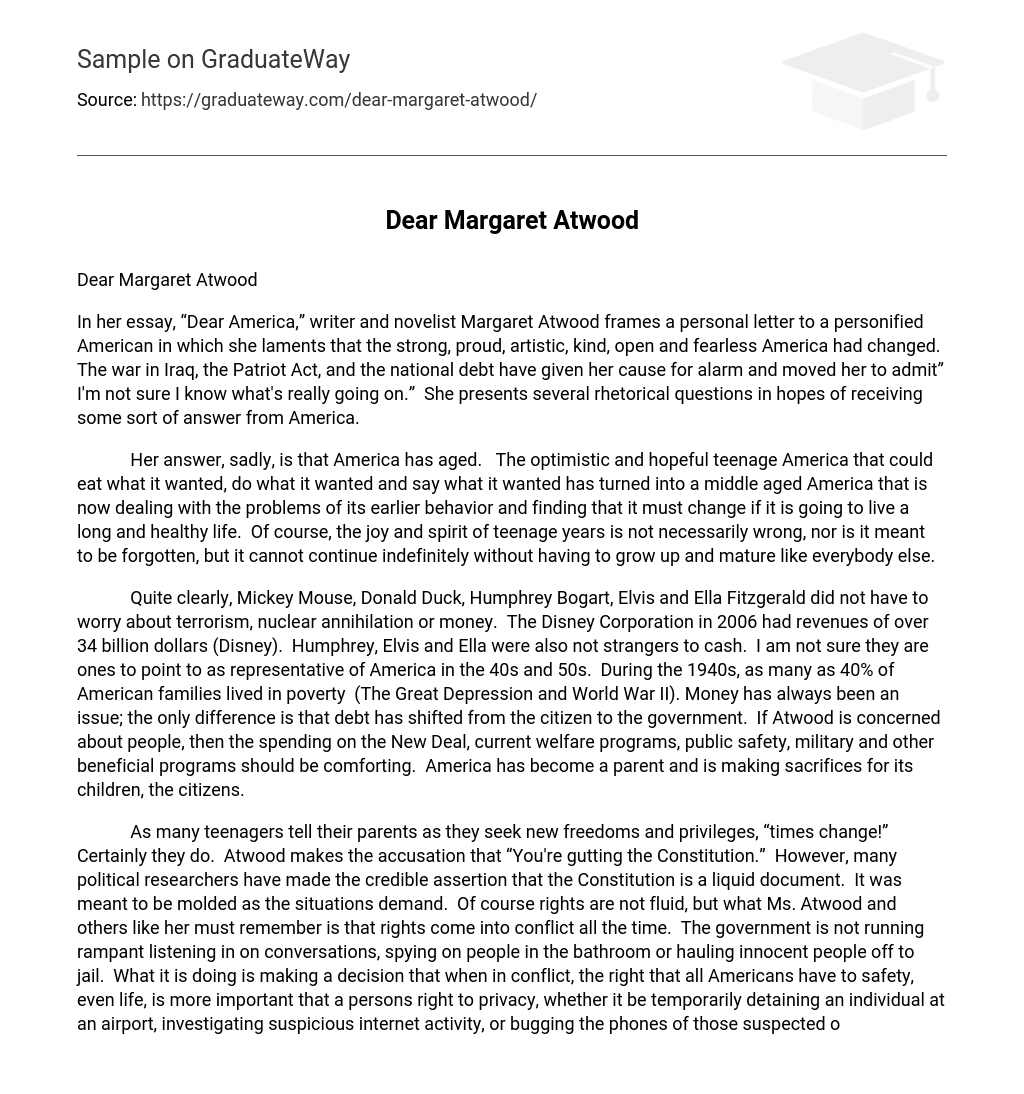In her essay, “Dear America,” writer and novelist Margaret Atwood frames a personal letter to a personified American in which she laments that the strong, proud, artistic, kind, open and fearless America had changed. The war in Iraq, the Patriot Act, and the national debt have given her cause for alarm and moved her to admit” I’m not sure I know what’s really going on.” She presents several rhetorical questions in hopes of receiving some sort of answer from America.
Her answer, sadly, is that America has aged. The optimistic and hopeful teenage America that could eat what it wanted, do what it wanted and say what it wanted has turned into a middle aged America that is now dealing with the problems of its earlier behavior and finding that it must change if it is going to live a long and healthy life. Of course, the joy and spirit of teenage years is not necessarily wrong, nor is it meant to be forgotten, but it cannot continue indefinitely without having to grow up and mature like everybody else.
Quite clearly, Mickey Mouse, Donald Duck, Humphrey Bogart, Elvis and Ella Fitzgerald did not have to worry about terrorism, nuclear annihilation or money. The Disney Corporation in 2006 had revenues of over 34 billion dollars (Disney). Humphrey, Elvis and Ella were also not strangers to cash. I am not sure they are ones to point to as representative of America in the 40s and 50s. During the 1940s, as many as 40% of American families lived in poverty (The Great Depression and World War II). Money has always been an issue; the only difference is that debt has shifted from the citizen to the government. If Atwood is concerned about people, then the spending on the New Deal, current welfare programs, public safety, military and other beneficial programs should be comforting. America has become a parent and is making sacrifices for its children, the citizens.
As many teenagers tell their parents as they seek new freedoms and privileges, “times change!” Certainly they do. Atwood makes the accusation that “You’re gutting the Constitution.” However, many political researchers have made the credible assertion that the Constitution is a liquid document. It was meant to be molded as the situations demand. Of course rights are not fluid, but what Ms. Atwood and others like her must remember is that rights come into conflict all the time. The government is not running rampant listening in on conversations, spying on people in the bathroom or hauling innocent people off to jail. What it is doing is making a decision that when in conflict, the right that all Americans have to safety, even life, is more important that a persons right to privacy, whether it be temporarily detaining an individual at an airport, investigating suspicious internet activity, or bugging the phones of those suspected of terrorist actions.
Of course, all parents who encourage teenagers of wrongdoing are not always correct in their accusations. Neither is the government, but most would acknowledge that preventing a teen from harming himself with dangerous drugs or from taking a shotgun to school is more important than the privacy violation of snooping in his room. Without cause, or in this case, without a conflict of rights, most parents don’t snoop. Neither does the government.
Finally, the framers of the Constitution did not live with the very real threat of nuclear and biological weapons. The current threat is not just one musket that can kill a person, or one bomb that can devastate a town, but a push of a button that can end civilization as people now know it. Taking efforts to mobilize the military and the world to defend against this end is not sliding “further down the slippery slope” such that “people around the world will stop admiring the good things about you [the United States].”
Most developmental and adolescent psychologists will tell you that parents who befriend their children or who want to ‘look good’ to them and their friends, are not doing those children any favors. The United States is not in a popularity contest or up for a prize. It is trying to save itself from forces that are partly its own fault and partly the result of the unavoidable actions of others and of the nature of the world itself.
Ms. Atwood seems to be very demanding of her government, and she should be. She is also nostalgic for the past. Who isn’t? What she must understand is that the true challenge of a parent and of a country is to adapt to new circumstances and new challenges when times demand it. A surgeon would not refuse to use new technology in surgery to guarantee the survival of his patient, and the government should not eschew new ideas and strategies either.
Former English Prime Minister Benjamin Disraeli is known for his many controversial political actions in the 1800s. He always answered those that were opposing his decisions with his noted phrase: “Change is inevitable. Change is constant.” Those who do not realize this truth are doomed.
“Benjamin Disreali.” Brittania. http://www.britannia.com/bios/disraeli.html. 1999.
“The Great Depression and World War II.” Enotes. http://history.enotes.com/1940-lifestyles-
social-trends-american-decades. 2007.
The Walt Disney Company. Wikipedia. http://en.wikipedia.org/wiki/
The_Walt_Disney_Company. 2007
;





